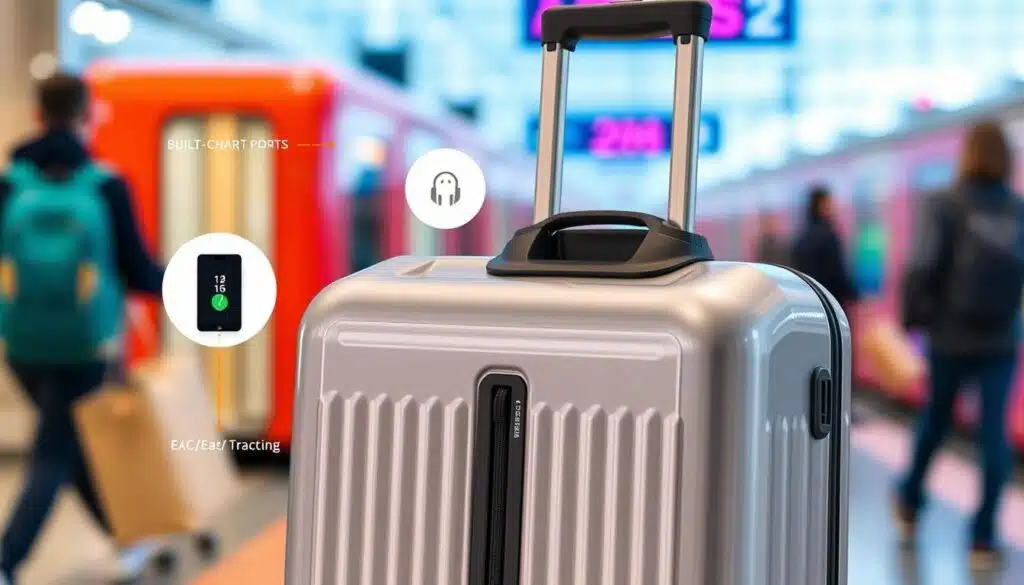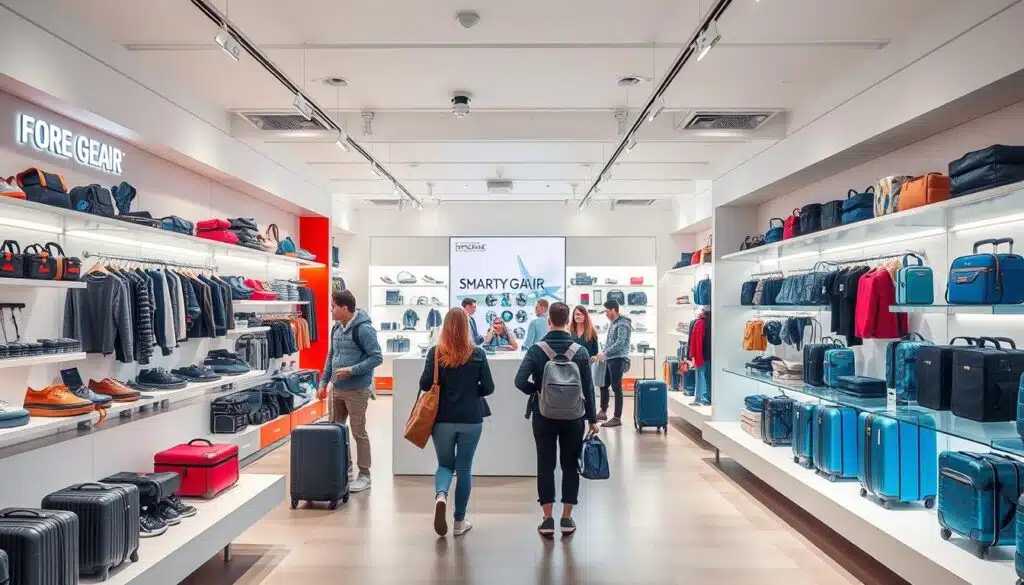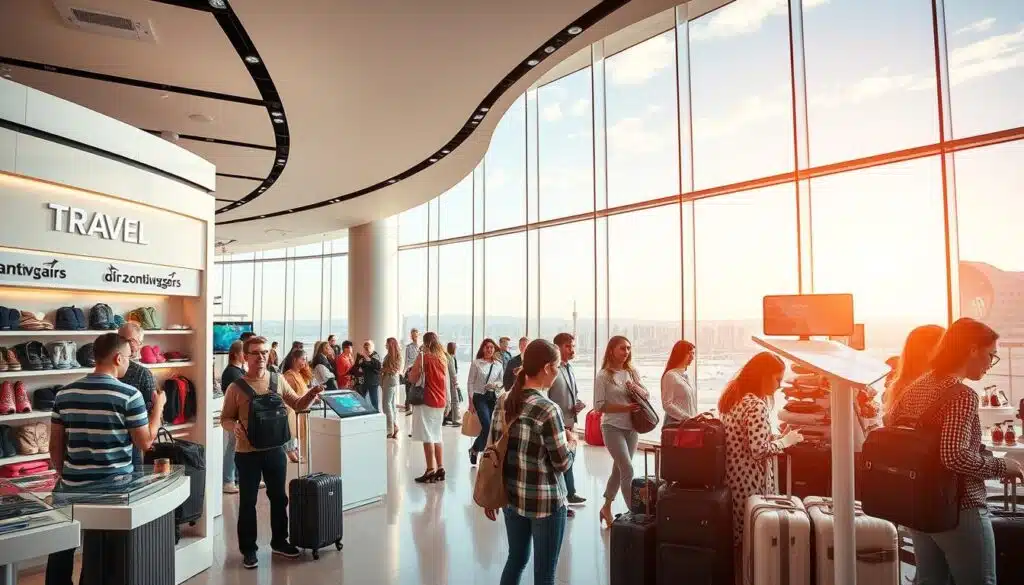The travel gear and technology world is buzzing with new ideas. Products like smart luggage with charging and tracking are now available. These items make traveling easier and more fun.
Travelers want products that are both high-tech and eco-friendly. They look for things that make their trips better and more comfortable. The travel store industry is listening, offering a variety of gadgets and gear to meet these needs.
Key Takeaways
- The travel gear and technology industry is experiencing a surge of innovative products to enhance the travel experience.
- Consumers are seeking out high-tech, eco-friendly, and personalized travel products that simplify their journeys.
- Travel stores are introducing a wide range of cutting-edge travel gear and gadgets to meet the growing demand for travel-friendly and tech-savvy solutions.
- Smart luggage with built-in charging and tracking capabilities are becoming increasingly popular.
- Sustainable and stylish travel accessories are gaining traction as consumers prioritize eco-friendly options.
Innovative Travel Startups Shaping the Future
The travel industry is seeing a lot of new startups. They are working on solutions and products to fix big problems. These startups use the latest tech to make travel better for everyone.
Also Read : The Art Of Traveling Light Packing Smart For Any Trip
Beachy: Enhancing Resort Experiences
Beachy is a mobile platform that helps resorts and guests. It uses mapping tech to find guests and make payments easier. This has led to a 30-50% pay increase for servers and a better experience for everyone.
Other startups like Chekin and Kyte are also changing the travel world. Chekin helps vacation rentals stay legal in Europe. Kyte makes it easier to find cheap flights by keeping up with airline changes.
Vouch is a travel-tech company that helps hotels run better. It offers a guest platform and a back-end system for hotel management. The CEO talks about the challenges of growing in the APAC market but sees more M&A in travel.
These startups are tackling big issues in travel and hospitality. They use AI and machine learning to innovate and improve travel for everyone.
“The funding environment for travel startups is tough with a small pool of available capital, but the increased demand for technology-driven solutions in hotels and vacation rentals is undeniable.”
The Rise of Smart Luggage and Sustainable Designs

Key Players and Market Segmentation
Also Read : Beach Photography Tips To Capture Stunning Sunsets
The luggage and travel bags market is growing fast, with a 6.4% CAGR expected. This growth is due to more people living in cities, better airports, and higher incomes. Companies are making eco-friendly and smart luggage to meet the demand of green consumers.
Horizn Studios is a top brand that made the Circle One, a luggage made from plant-based materials. The market is split into backpacks, duffles, and trolleys, with backpacks leading. Big names like Samsonite and LVMH Group are launching new products and expanding to stay ahead.
| Product Type | Market Share |
|---|---|
| Backpacks | Largest market share |
| Duffles | Fastest-growing segment |
| Trolleys | Significant market presence |
Smart luggage is becoming popular with features like internet, RFID, and USB. These innovations aim to make travel easier and more connected. The focus on sustainability is also changing the market’s direction.
“Sustainability and technological advancements are key trends that are transforming the luggage and travel bags industry, as consumers increasingly demand eco-friendly and innovative products to enhance their travel experiences.”
Reimagining the Travel Store Experience

The travel retail industry is facing a big challenge. It needs to boost conversion rates and meet the changing needs of travelers, especially Gen Z. Travel retail leaders know they must change the in-store experience to be more engaging and personal.
Also Read : Seaside Picnic Ideas For A Memorable Beach Day
To meet local consumers’ needs, travel stores are now offering a carefully chosen product assortment. This change has made fragrance sales grow faster than skin care and makeup. Brands are using omnichannel, multihouse concepts to offer a tailored experience based on location and audience.
Catering to Gen Z and Experiential Shopping
Gen Z, now nearly 40% of travel retail visitors, is key to attract. They look for unique, exclusive, and personalized items that show self-indulgence. Travel stores are creating experiential shopping experiences. These allow customers to dive into the brand and its products.
| Brand | Unique Offerings | Target Audience |
|---|---|---|
| Brand A | Exclusive skincare line, customized fragrance blending station | Gen Z, local consumers |
| Brand B | Augmented reality makeup try-on, personalized product recommendations | Gen Z, global travelers |
| Brand C | Immersive product displays, limited-edition collaborations | Local consumers, global brands |
By reimagining the travel store experience and focusing on Gen Z’s experiential shopping, travel retail brands can boost conversion rates. They can also build a stronger connection with their customers.
Travel Store Trends: Exclusivity and Niche Brands

The travel retail industry is seeing a big shift towards exclusivity and niche brands. These changes meet the growing needs of sophisticated shoppers. High-end, artisanal fragrances are becoming more popular. Stores like Avolta are opening Haute Parfumerie shops with brands like L’Artisan Parfumeur and Byredo.
Also Read : The Ultimate Guide To Beach Camping Adventures
Luxury brands are now selling their special collections in travel retail. Bulgari’s Le Gemme and Allegra lines are available in more places. DFS is setting up special areas for new and luxury beauty brands. This helps them stand out and meet the demand for unique products.
This focus on exclusivity and personalization is what younger travelers want. Travel retailers are offering a selection of unique, high-end brands. This helps them stand out and meet the growing demand for special products and shopping experiences.
| Brand | Category | Exclusivity in Travel Retail |
|---|---|---|
| L’Artisan Parfumeur | Artisanal Fragrance | Exclusive shops-in-shop in Avolta Haute Parfumerie stores |
| Byredo | Niche Fragrance | Showcased in Avolta Haute Parfumerie stores and DFS curated spaces |
| Maison Francis Kurkdjian | High-end Fragrance | Featured in Avolta Haute Parfumerie stores and DFS travel retail environments |
| Bulgari Le Gemme | Luxury Fragrance | Exclusive travel retail distribution through Bulgari boutiques and duty-free shops |
| Bulgari Allegra | Luxury Fragrance | Selective travel retail presence in high-end duty-free and travel retail stores |
By focusing on exclusivity and niche brands, travel retailers offer unique experiences. They provide personalized shopping that meets the evolving tastes of today’s travelers.
Also Read : What Are The Essential University Student Resources Every Freshman Should Know About?
Overcoming Challenges in Conversion Rates

The travel retail industry is facing big challenges in keeping and boosting conversion rates. Spend penetration has dropped to about 70% of 2019 levels. A big reason is the price matching between travel retail and local markets, especially for Chinese travelers. They’re used to lower prices at home, making them less likely to buy in travel retail.
Also, the passenger profiles have changed, with fewer Chinese and Russian travelers. To tackle these issues, the industry is focusing on local consumers. It’s also tailoring products to regional tastes. Fragrance sales are now outpacing skin care and makeup, so brands need to adjust their strategies.
Retailers must find new ways to grow profitably and sustainably. Boosting customer retention by just 5% can increase profits by 25% to 95%. By understanding what customers want and using new technologies, retailers can improve their sales and offer personalized experiences. This can lead to higher customer loyalty and conversion rates.
| Key Challenges | Strategies for Improvement |
|---|---|
|
|
“By 2025, 75% of customer interactions will be managed by AI-powered chatbots, according to research from Gartner.”
The travel retail industry must adapt to the changing world. Customer acquisition costs are seen as higher than ever. By understanding the challenges and using specific strategies, retailers can beat the conversion rate hurdles. This will help drive sustainable growth in the travel retail market.
The Evolving Landscape of Travel Retail

The travel retail industry is going through big changes, as seen at the TFWA World Exhibition and Conference in Cannes. Leaders are trying to make shopping better for travelers and boost sales. This is hard because of world events and slower sales in China.
Despite these challenges, the industry is optimistic about the future. It expects more travelers by 2028. To stay relevant, it needs to meet the changing tastes of younger shoppers, especially Gen Z. Brands are trying new things like unique stores and using tech to make shopping personal.
The duty-free travel retail market is growing fast, with a 6.2% CAGR from 2024 to 2031. Here are some sales estimates for big players:
- Dufry: Approximately $3.5 billion
- China Duty Free Group: Approximately $2.4 billion
- Dubai Duty Free: Approximately $1.8 billion
- Lagardère Travel Retail: Approximately $1.5 billion
Regional trends also shape the global travel retail scene. North America and Europe are big players. Asia-Pacific and Latin America are growing fast. The Middle East and Africa are also important.
Brands like L’Oréal travel retail, Estée Lauder Cos., and Groupe Clarins are leading the way. They’re adapting to the changing market and focusing on Gen Z’s preferences.
“The travel retail industry is at a critical juncture, where innovation and a deep understanding of the evolving passenger experience are essential for success. Brands that can harness the power of technology, create memorable experiences, and cater to the preferences of the next generation of travelers will thrive in this dynamic and ever-changing landscape.”
The future of travel retail looks bright and full of change. It could change how we shop and experience travel.
Also Read : Family-friendly Hotel Pool: Fun For Everyone
Conclusion
The travel store industry is changing fast. New startups, smart luggage, and green designs are leading the way. Brands are now focusing on making shopping more personal and unique for today’s travelers.
They’re especially paying attention to Gen Z’s needs. This means creating special, one-of-a-kind shopping spots. But, they’re also facing a big challenge: getting more people to buy.
With prices getting closer and who’s traveling changing, it’s tough. Yet, the industry is still growing and looking for new ways to improve.
As the travel retail world keeps changing, companies are finding new ways to make travel better. They’re using technology, listening to local tastes, and offering unique products. This helps them stay ahead in a market that’s always shifting.
The global travel tech market is set to grow a lot. It’s expected to hit $21 billion by 2032. This growth is thanks to new tech like mobile payments and AI.
In short, the future of travel stores looks exciting and full of new ideas. Companies that can keep up with what customers want, rules, and tech will do well. They’ll make sure travelers have a great time shopping.
FAQs
Q: What are the essential travel accessories I should consider for my next trip?
A: Essential travel accessories include a travel adapter for different countries, packing organizers to keep your belongings neat, a passport holder for easy access to your documents, and a durable carrier for your essentials. Additionally, consider items like a bottle for hydration, luggage locks for security, and a comfortable neck strap for your travel needs.
Q: How do I choose the right size for my carry on suitcase?
A: When selecting a carry on suitcase, ensure it meets the size requirements of your airline. Typically, a carry on should not exceed 22 x 14 x 9 inches, but always check your airline’s specific guidelines. A suitcase with a 360-degree wheel design can offer better maneuverability in crowded airports.
Q: Can I purchase a travel adapter that works worldwide?
A: Yes, you can purchase a universal travel adapter that is designed to work in multiple countries. These adapters usually come with various plug types and can accommodate different voltage ranges, making them perfect for international travelers.
Q: What features should I look for in a quality travel bottle?
A: When looking for a travel bottle, consider features such as leak-proof design, durability, and ease of cleaning. Look for bottles that are made from high-quality materials and are compatible with various types of drinks, including coffee and water.
Q: Are RFID blocking passport holders really necessary?
A: RFID blocking passport holders can provide an extra layer of security for travelers by protecting your personal information from electronic pickpocketing. They are especially useful for international travel where your passport contains sensitive data.
Q: What are packing organizers and how do they help travelers?
A: Packing organizers are designed to help travelers keep their belongings sorted and easily accessible. By using packing cubes or pouches, you can separate clothing, electronics, and accessories, making the packing and unpacking process quicker and more efficient.
Q: How can I ensure the safety of my luggage while traveling?
A: To ensure the safety of your luggage, consider using luggage locks and RFID blocking accessories. Additionally, always keep your valuables in a secure holder or pouch, and be mindful of your surroundings, especially in busy travel hubs.
Q: Is it possible to find travel accessories that are eco-friendly?
A: Yes, many brands now offer eco-friendly travel accessories made from sustainable materials. Look for products that are labeled as environmentally friendly, such as reusable bottles, bags made from recycled materials, and biodegradable packing solutions.
Q: What types of travel bags are best for outdoor adventures?
A: For outdoor adventures, durable backpacks or daypacks with features like hydration reservoirs, multiple compartments, and weather-resistant materials are ideal. Look for bags with comfortable straps and enough space to carry essentials like clothing, gear, and snacks for the day.




